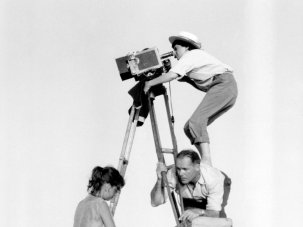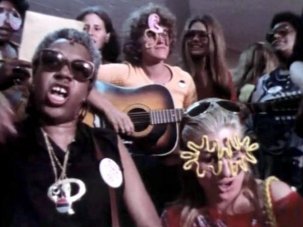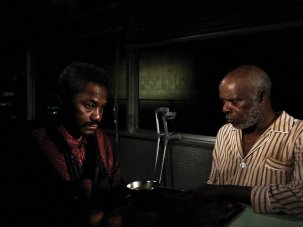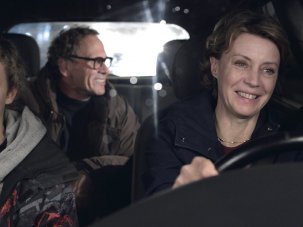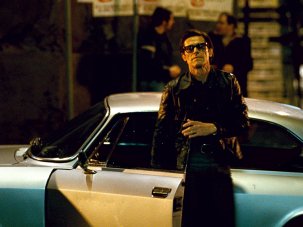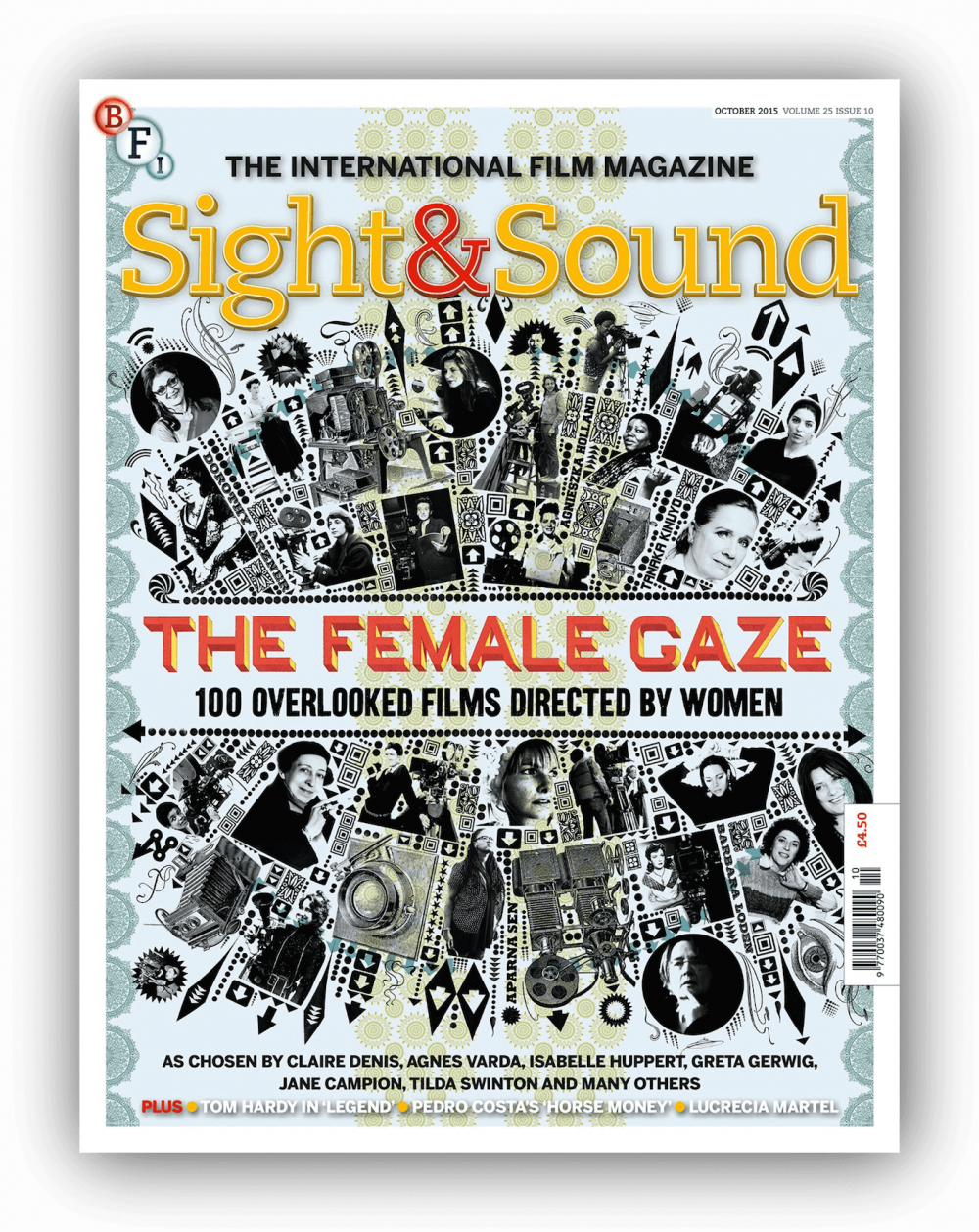
Just because there are intolerable gender disparities in the cinema doesn’t mean there aren’t triumphs and treasures of female-made film art. Sadly the dominance of male-led movies extends to the conversation about cinema too, and so what is already deprecated further recedes from view.
Posted to subscribers and available digitally 7 September
→ Access the digital edition
→
On UK newsstands 10 September
Our Female Gaze project aims to challenge official film history by writing female directors back into it. In our October special issue we champion 100 hidden gems directed by women who have been forgotten or unfairly overlooked; the contributors include Jane Campion, Greta Gerwig, Claire Denis, Isabelle Huppert, Agnès Varda, Tilda Swinton, Allison Anders, Carol Morley, Sarah Gavron and many more critics, while the films range from across the last century, and from around the world.
Extending the theme, Mark Cousins decries the presumption of female disenfranchisement across the history of cinema, which draws a veil over the actually existing heritage of female filmmaking around the world. “Young directors should be taught about Pirjo Honkasalo and Larisa Shepitko, like they’re taught about Richard Leacock and Tarkovsky,” he writes.
Ruth Lingford looks at the fading of women’s voices from the animation world over the past two or three decades, while Virginie Selavy profiles the women blazing a back-alley trail in the world of horror cinema. And Diego Lerer visits the set of the first film in seven years from Lucrecia Martel (The Holy Girl, The Headless Woman), one of the leading lights of the Argentinian New Wave, as she tackles her first costume film in the form of an adaptation of the classic Argentinian novel Zama, set in 18th-century Paraguay.
Elsewhere in this issue, Nick James talks to director Brian Helgeland about his new take on the increasingly mythical London gangsters Ronnie and Reggie Kray – both played by Tom Hardy, whose chameleon-like genius David Thomson appraises.
And speaking of violence and myth, French philosopher Jacques Rancière talks us through the latest from Portuguese master Pedro Costa, Horse Money, set across two floors of a Lisbon hospital whose lift “plays the role of Charon’s ferry between… on the one hand the subterranean labyrinth belonging to the kingdom of death and on the other the corridors of an ordinary hospital where society treats those who it has exhausted or mutilated.”
And in our last feature Geoff Andrew talks to Italian great Nanni Moretti about his recent Cannes Competition entry Mia Madre, an autobiographically inspired portrait of a film director living with the impending death of her mother.
All this and more…
Features
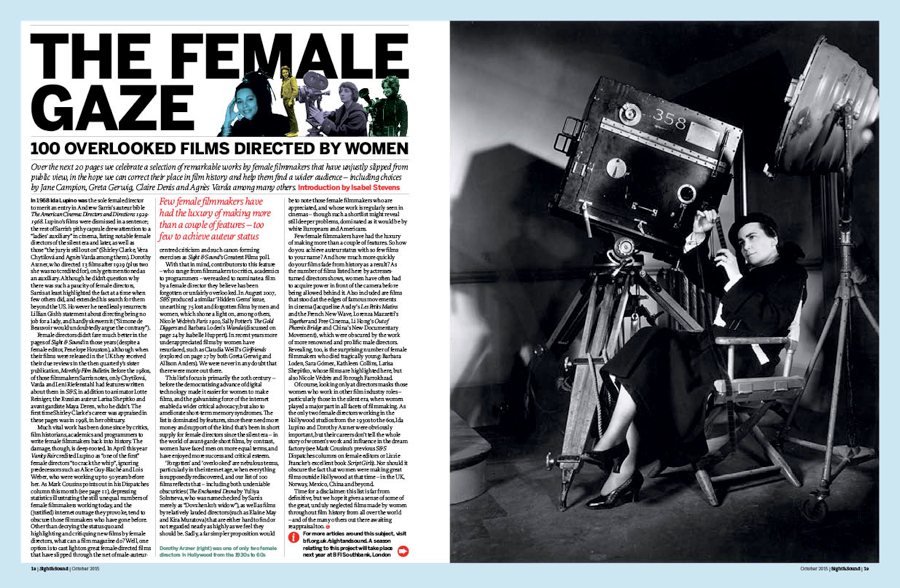
The Female Gaze: 100 Overlooked Films Directed by Women. Over 20 pages we celebrate a selection of remarkable works by female filmmakers that have unjustly slipped from public view, in the hope we can correct their place in film history and help them find a wider audience. Introduction by Isabel Stevens.
+ Out of the shadows
In the late 80s female animators were shaping the future of the form – but since then women’s voices have faded from the industry. By Ruth Lingford.
+ Bloody-minded women
For years typecast in horror films as victims and scream queens, women are moving behind the camera in ever-increasing numbers. By Virginie Sélavy.
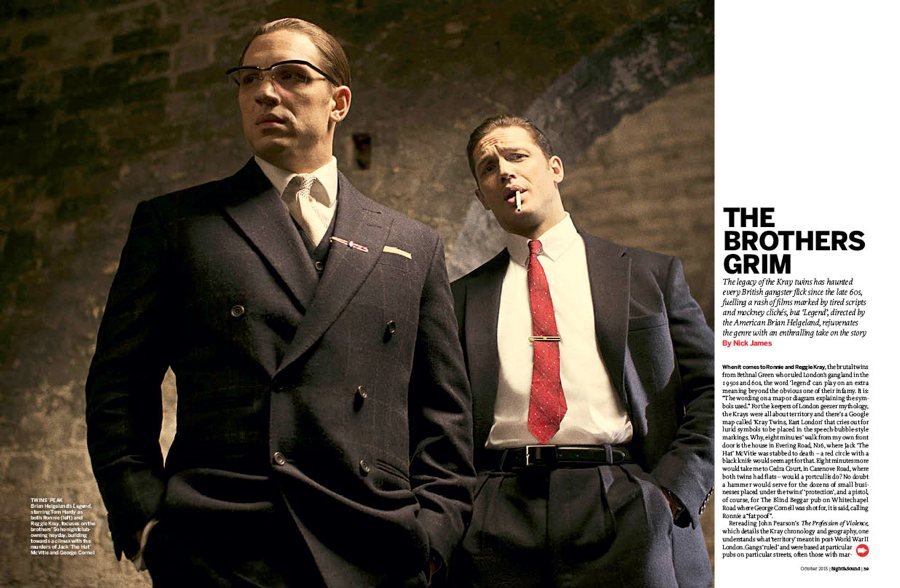
The Brothers Grim
The legacy of the Kray twins has haunted every British gangster flick since the late 60s, fuelling a rash of films marked by tired scripts and mockney clichés, but Legend, directed by the American Brian Helgeland, rejuvenates the genre with an enthralling take on the story. By Nick James.
+ Looking for Mr. Hardy
Tom Hardy’s chameleon-like genius as an actor is so compelling that he needn’t have stopped at playing the Kray twins – he could easily have taken on the role of their mother too. By David Thomson.
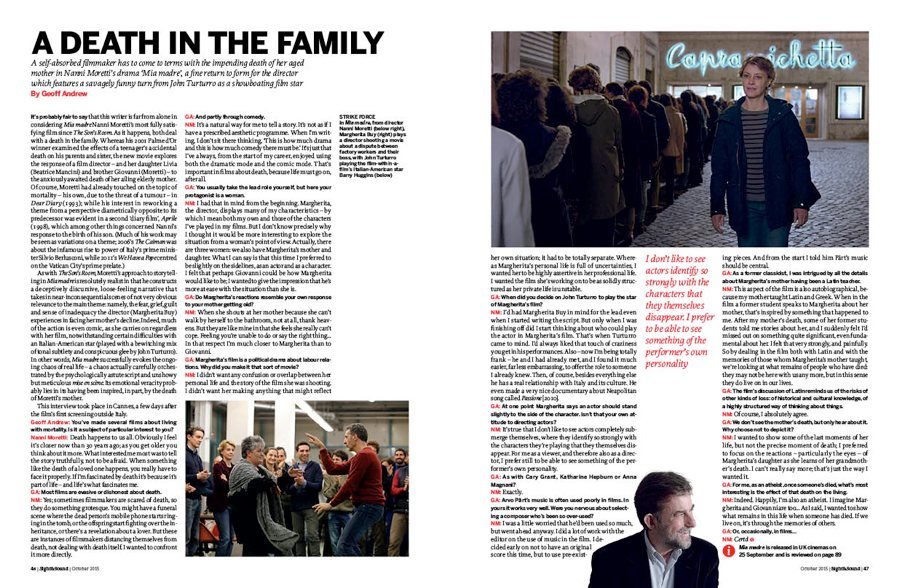
A Death in the Family
A self-absorbed filmmaker has to come to terms with the impending death of her aged mother in Nanni Moretti’s drama Mia madre, a fine return to form for the director which features a savagely funny turn from John Turturro as a showboating film star. By Geoff Andrew.
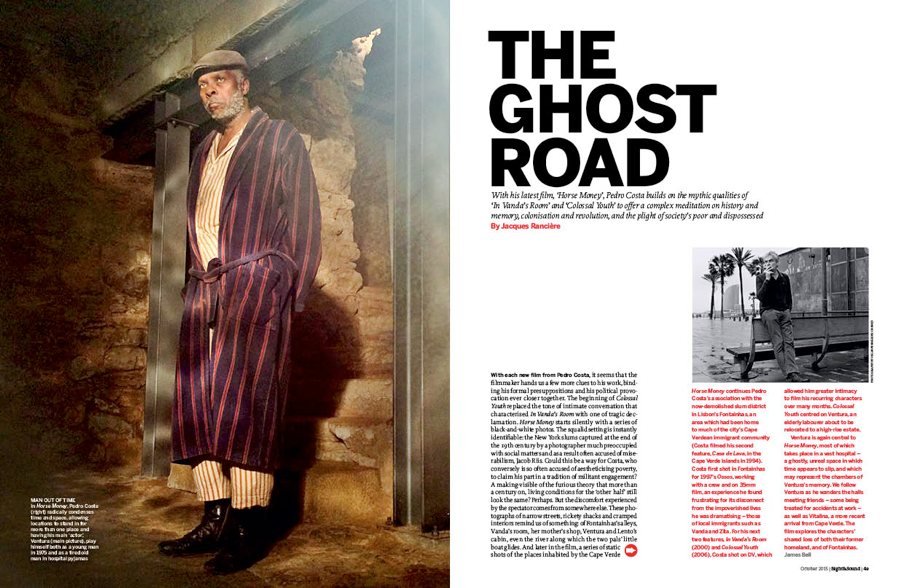
The Ghost Road
With his latest film, Horse Money, Pedro Costa builds on the mythic qualities of In Vanda’s Room and Colossal Youth to offer a complex meditation on history and memory, colonisation and revolution, and the plight of society’s poor and dispossessed. By Jacques Rancière.
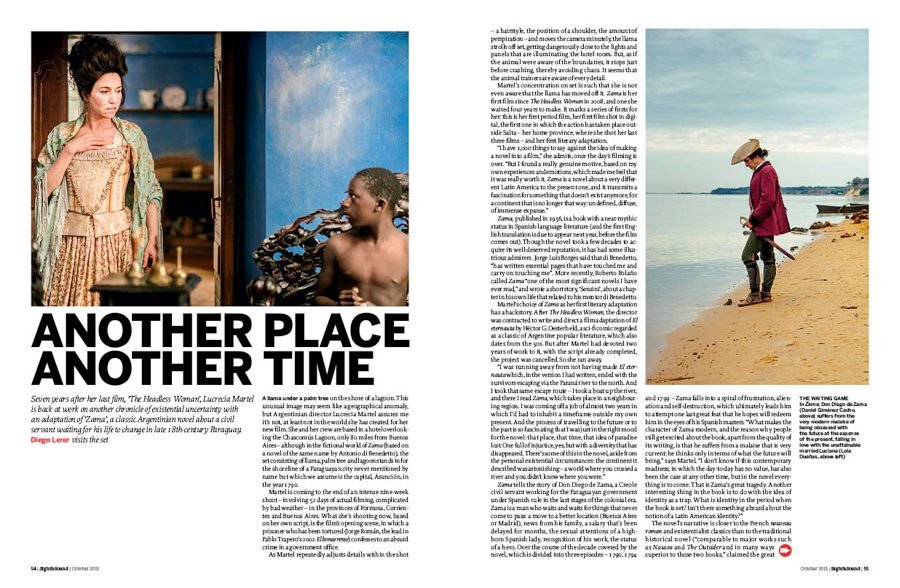
Another Place Another Time
Seven years after her last film, The Headless Woman, Lucrecia Martel is back at work on another chronicle of existential uncertainty with an adaptation of Zama, a classic Argentinian novel about a civil servant waiting for his life to change in late 18th-century Paraguay. Diego Lerer visits the set.
Regulars
Editorial
Male and female auteurs and the ‘anxiety of influence’.
Rushes
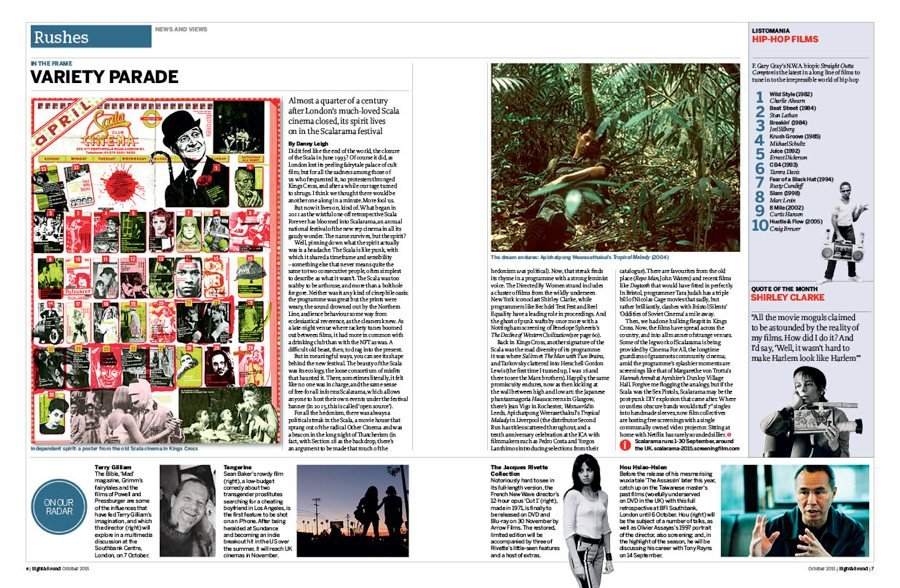
Our Rushes section
In the frame: Variety parade
Almost a quarter of a century after London’s much-loved Scala cinema closed, its spirit lives on in the Scalarama festival. By Danny Leigh.
Listomania: Hip-hop films
Object lesson: Card tricks
Even in the digital age, the business card clings on – often less a proof of identity than a hint that something needs proving. By Hannah McGill.
The five key…: Director biopics
With Pasolini, Abel Ferrara joins a burgeoning tradition of directors celebrating the lives and work of fellow filmmakers. By Michael Brooke.
Preview: the BFI London Film Festival
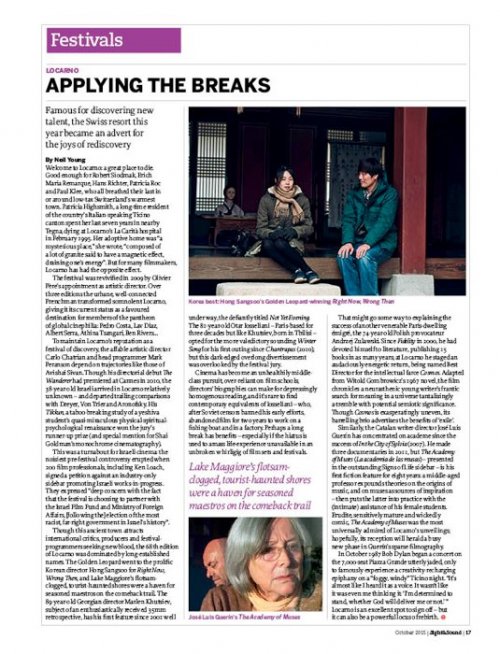
Our Festivals section
Huge variety is always on offer at the LFF but this year looks potentially more bountiful and audience-friendly than ever. By Nick James.
Dispatches: Assuming that they’re there
Yes, women get pushed to the margins of the film business – but there are great women filmmakers out there, and always have been. By Mark Cousins.
Festival
Locarno: applying the brakes
Famous for discovering new talent, the Swiss resort this year became an advert for the joys of rediscovery. By Neil Young.
The industry
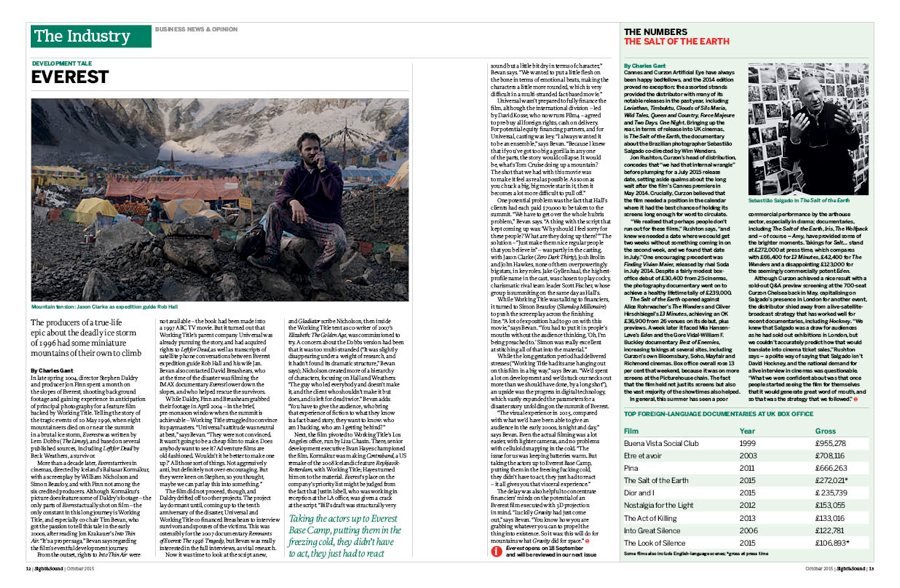
Our Industry section
Development tale: Everest
The producers of a true-life epic about the deadly ice storm of 1996 had some miniature mountains of their own to climb. By Charles Gant.
The numbers: The Salt of the Earth and foreign-language documentaries at the box office
Brewster: Box office actually
The British film industry is not nearly as London-centric as people think – but the capital’s gravitational pull is still a problem. By Ben Roberts.
Wide angle

Our Wide Angle section
Profile: Marguerite mon amour
As scriptwriter, director, star, Marguerite Duras created a unique, poetic body of film. Why, then, do we see her work so rarely? By Thirza Wakefield.
Soundings: History woman
From hardcore to hair metal to gutter punk, Penelope Spheeris’s Decline trilogy dissects LA’s post-punk music scene. By Nick Pinkerton.
Primal screen: The world of silent cinema
Whether adding colour or whitewashing scandal, the feminine touch was essential to early Hollywood. By Pamela Hutchinson.
Artists’ moving image: Marx and recreation
The scale of this year’s Biennale swamped its political intentions, but some artists remembered that revolution could be fun. By John Beagles.
Profile: The Excavator
Intellectually sophisticated, moving between documentary and fiction, the films of Louis Henderson grapple with big ideas. By Sukhdev Sandhu.
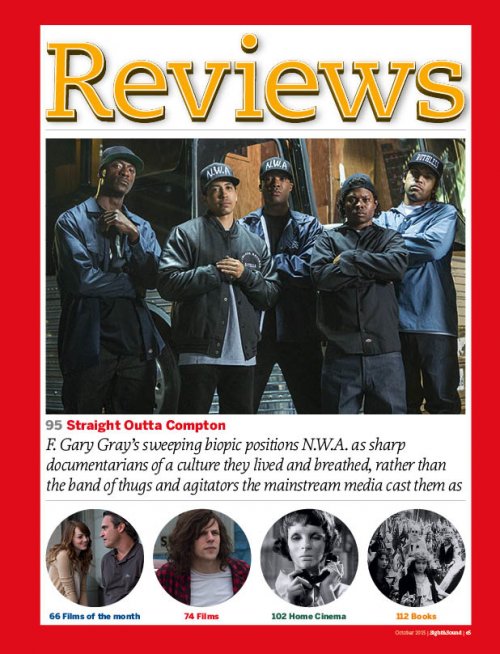
Our Reviews section
Reviews
Films of the month
Irrational Man
Macbeth
Miss Julie
Pasolini
plus reviews of
Absolutely Anything
Alive Inside
American Ultra
The Bad Education Movie
Brothers
Containment
The Dance of Reality
Death of a Gentleman
En équilibre
Escobar: Paradise Lost
La Famille Bélier
Fantastic Four
The Gift
A Girl at My Door
Horse Money
How to Change the World
Infini
Just Jim
Legend
The Man from U.N.C.L.E.
Marc Quinn: Making Waves
The Messenger
Mia madre
Misery Loves Comedy
Mission: Impossible – Rogue Nation
99 Homes
Orion: The Man Who Would Be King
Pixels
Pleasure Island
The Pyramid Texts
Ricki and the Flash
Straight Outta Compton
A Syrian Love Story
Tangerines
3½ Minutes
Vacation
A Walk in the Woods
The World of Astley Baker Davies
Zombie Fight Club
Home Cinema features
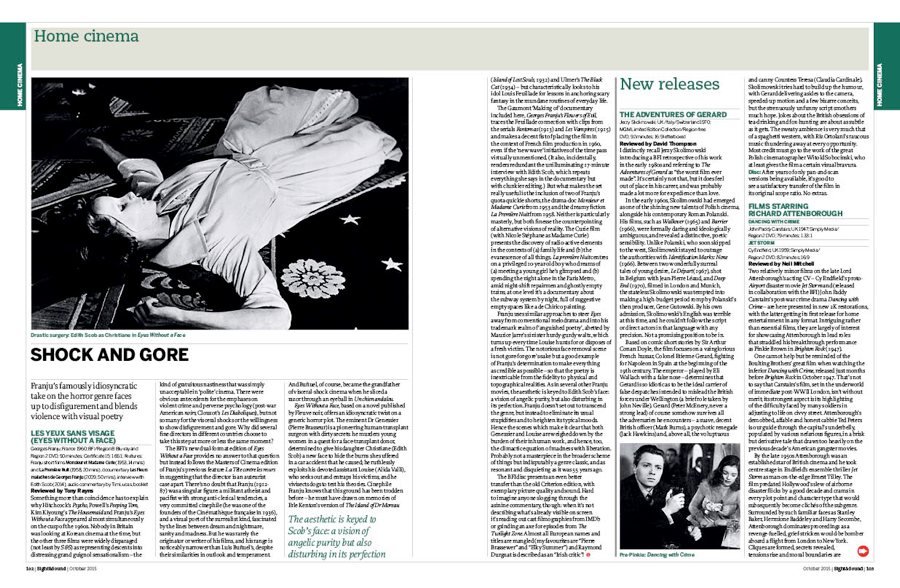
Our Home Cinema section
Shock and gore: Les Yeux sans visage / Eyes without a Face
Franju’s famously idiosyncratic take on the horror genre faces up to disfigurement and blends violence with visual poetry. By Tony Rayns.
Technical: True colours
Glaringly bright televisions rarely show movies as their makers intended. Dedicated film fans, please adjust your sets. By David Mackenzie.
Lost and found: Girl Stroke Boy
The arrival of an androgynous ‘girlfriend’ throws a middle-class couple into chaos in this early exploration of LGBT issues. By Alex Davidson.
plus reviews of
The Adventures of Gerard
Films starring Richard Attenborough
Cruel Story of Youth
Here Is Your Life
The Maggie
Pickup on South Street
Run of the Arrow
The Town that Dreaded Sundown
Varieté
Vivre sa vie
Television
The Avengers: Series 5
The Game
Jonathan Strange & Mr Norrell
Quatermass
Books
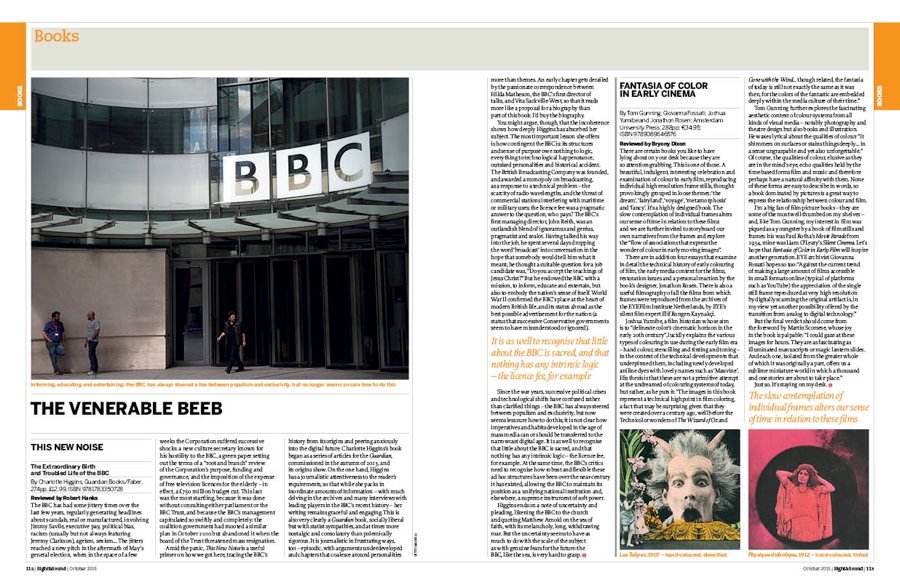
Our Books section
This New Noise: The Extraordinary Birth and Troubled Life of the BBC by Charlotte Higgins (Guardian Books/Faber) reviewed by Robert Hanks.
Fantasia of Color in Early Cinema by Tom Gunning, Giovanna Fossati, Joshua Yumibe and Jonathon Rosen (Amsterdam University Press) reviewed by Bryony Dixon.
The Birth of a Nation by Paul McEwan (BFI Film Classics/Palgrave) reviewed by Pamela Hutchinson.
The Magic Screen: A History of Regent Street Cinema edited by Elaine Penn (University of Westminster) reviewed by Henry K. Miller.
Letters
Young Aphrodites: no mere sex film
Scope 50 and how ‘drivel’ gets distributed
Uta Erickson/Artemidia Grillet, elective personas and trashed reputations
Robert Ryan the great
Ongoing failures of DVD distribution
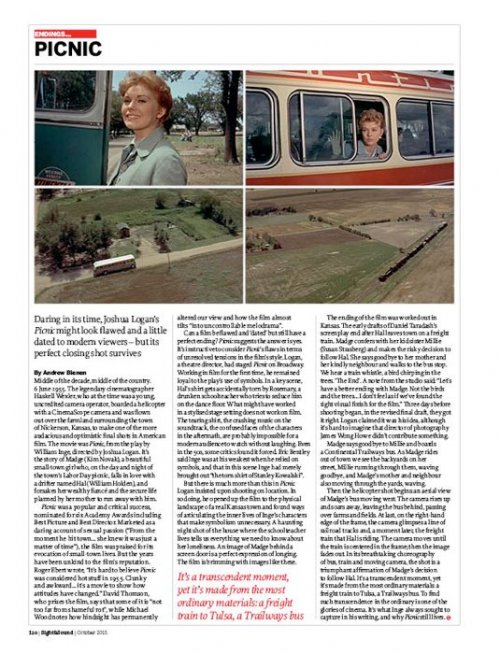
Our Endings section
Endings
Picnic
Daring in its time, Joshua Logan’s Picnic might look flawed and a little dated to modern viewers – but its perfect closing shot survives. By Andrew Bienen.
-
Women on Film – all our coverage
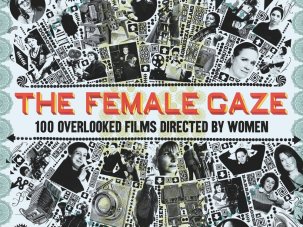
A window on our ongoing coverage of women’s cinema, from movies by or about women to reports and comment on the underrepresentation of women...
Further reading
-
The Digital Edition and Archive quick link
Log in here to your digital edition and archive subscription, take a look at the packages on offer and buy a subscription.





